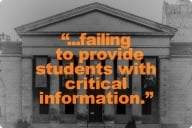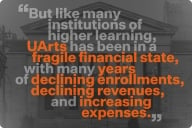You have /5 articles left.
Sign up for a free account or log in.
City College of San Francisco may get two more years to work on keeping its accreditation, thanks to a shift by the Accrediting Commission for Community and Junior Colleges.
The college is facing termination of accreditation by the commission in July, with a reprieve until October, when a legal challenge is scheduled for trial. The threat of that possible death blow has roiled City College, which enrolls 77,000 students.
The crisis had become increasingly politicized in recent months.
Community college officials in California argued that the college had made substantial progress in correcting a wide range of governance problems and financial mismanagement the commission had identified. Faculty groups accused the commission of making mistakes and treating the college unfairly.
Supporters said City College provides a good education to students who have few other options. As a result, they said the college is too important to fail.
Accreditation on 'This Week'
Join us for a discussion
of accreditation politics on
"This Week @ Inside Higher
Ed," our new audio newscast.
Click here to sign up for an
email reminder, or here to listen
to recent programs.
State and federal politicians also joined the fray. For example, Rep. Nancy Pelosi had issued strongly worded condemnations of the commission. She and other Bay Area members of the U.S. Congress cited letters from the U.S. Department of Education, which appeared to give the commission cover to back down.
Until Wednesday the accreditor remained unswayed. The commission separated last year from the WASC Senior College and University Commission (WSCUC), and is now one of seven regional accrediting agencies. It faces an existential threat of its own, through the possible loss of federal recognition or state policy changes that could diminish its role in California. (Note: This paragraph has been changed from an earlier version to correct an erroneous reference to the commission's relationship with WSCUC.)
Last week the commission’s governing board held a regularly scheduled, closed meeting in which it approved new policy language on the accreditation death sentence. Commission officials then traveled to Washington earlier this week, according to sources, where they met with representatives from the Education Department.
The commission released the proposed policy change on Wednesday. It would allow any community college that has been notified of termination because of failure to meet commission standards to apply for “accreditation restoration” status.
A college would have to apply for that status before its accreditation is yanked. Once deemed eligible to apply, the college would face an “intensive review to demonstrate its ability to come into compliance with all standards within a two-year period.” If the commission decides that the college could possibly fix the problems within that time period, it would then grant a two-year extension.
The details were still unclear on Wednesday. And City College would need assurance that it would remain accredited as part of the newly proposed pathway. Otherwise the college still would be in dire straits, having lost access to state support and federal financial aid.
City College almost certainly would apply for restoration status if it could keep its accreditation during the process. And, given that the commission said Wednesday the college could be 18 months away from compliance, it would probably get the extra two years.
"We're pleased and cautiously optimistic," said Jeff Hamilton, a spokesman for the college. He said hard work by the college's faculty and staff has begun to pay off. "We've earned the right to more time."
However, Hamilton said college officials were still studying the proposed policy's possible impact.
Next Steps
The commission on Wednesday stuck by its move last year to terminate City College’s accreditation, effective next month.
“The decision was made due to years of inaction by CCSF to address serious deficiencies identified through peer reviews and acknowledged by the college,” it said in a written statement. “The commission has been, and will continue to be, steadfast in its decision, which was clearly warranted.”
However, the accreditor gave a nod to the looming catastrophe if it shuttered California’s largest college, which has already seen its enrollment dip by 27,000 students in recent years.
“The commission also recognizes the need to balance the impact of such a decision on students with its commitment to holding CCSF and all postsecondary institutions accountable in meeting core standards,” the statement said.
A two-week public comment period on the proposed policy change ends on June 25. The Education Department must determine that the revisions do not conflict with federal rules. However, the commission said it was optimistic that the feds would sign off on the policy.
Recent discussions with Education Department officials have been productive, the commission said, adding that the “language of the policy and its application to CCSF have been vetted.”
Supporters of City College stopped short of declaring victory. Faculty union leaders and community college officials said they were worried about remaining uncertainty for City College.
“We are encouraged that the commission appears willing to provide City College with a path forward to complete its recovery,” said Paul Feist, a spokesman for the California community college system, in a written statement. “We want to be assured, however, that any action taken removes the immediate threat of loss of accreditation and allows City College adequate time to come into full compliance.”
Timothy Killikelly, a professor of political science at City College and president of the college chapter of the American Federation of Teachers, a faculty union, said the restoration option was better than closing the college. But the union remains critical of the acceditor.
"This latest move, made under extraordinary pressure, seems more designed to save ACCJC than to save CCSF," Killikelly said in a written statement. "The commission needed to take action to end the uncertainty over our status."








